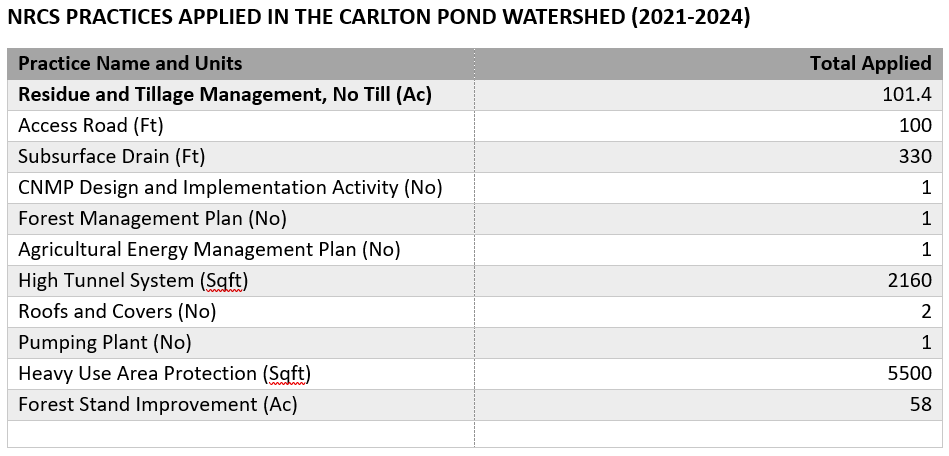NRCS Spotlight!
Partnering with farmers and foresters to protect watershed health
Photo: Aleta McKeage
Who Is NRCS and How Can They Help Farm and Forest Landowners?
Natural Resources Conservation Services (NRCS) is a non-regulatory agency under the USDA Farm Production and Conservation (FPAC) division and focuses on the conservation of natural resources to ensure availability to future generations. As a non-regulatory agency, they work together with farm and forest landowners to identify conservation concerns with their operations and provide cost-share through voluntary conservation programs. Working with landowners they provide advice and assistance on best practices to address resource concerns relating to soil, water, air, plants, and animals. Based on a landowner’s operation and objectives, they help develop conservation plans and offer voluntary conservation programs that can increase soil health and fertility, reduce erosion, improve animal habitat and diversity, and ensure healthy, sustainable farm and forestland for future generations of Mainers.
NRCS offers two types of assistance for conservation concerns: Conservation Technical Assistance and Financial Assistance
Conservation Technical Assistance
Our staff of soil conservationists, soil scientists, and engineers, along with our network of partners, can help offer Conservation Technical Assistance (CTA) to provide advice about conservation concerns at no cost. This advice is tailored to specific resource issues and is developed to help the landowner understand best practices addressing those concerns. It will also help them develop a course of action that may lead to voluntary participation in our Financial Assistance (FA) programs.
Financial Assistance
Through the USDA Farm Bill programs, NRCS offers Financial Assistance (FA) programs that can help landowners get conservation projects started. These are cost-sharing programs intended to help make conservation projects a reality. Program requirements vary under each Farm Bill, and program eligibility and requirements can change from year to year.
They encourage landowners to get in touch with their local NRCS office and explore cost-share programs that may enhance practices already being used or to put new ones in pace. When you stop by your local NRCS field office, they’ll discuss your vision for your land. As mentioned, NRCS also provides landowners with free technical assistance, or advice, for their land. Common practices you may be familiar with include high tunnels, agricultural waste facilities, cover cropping, and forestry management, among others.
The first step to be eligible for our programs is registering your land with your local Farm Service Agency (FSA), where you will be asked to provide tax maps and basic income verification to determine eligibility.
If you are interested in learning more, call the Belfast NRCS/FSA Field Office at 207/338-1964!
Here are some of the NRCS cost-share practices that are beneficial to watershed health:
Landowners within the Carlton & Unity Pond Watersheds are encouraged to reach out to your Belfast NRCS office to see if they can assist you with cost-share and technical support on conservation practices beneficial to watershed health. Call 207/338-1964.
Photo: Aleta McKeage
Unity Pond (Lake Winnecook) Watershed Management
Our District is a partner with Friends of Lake Winnecook on their 10-year Watershed-based Management Plan for Unity Pond (2023-2032). Unity Pond has been designated by Maine DEP as an “Impaired Lake” due to high levels of phosphorous and increased frequency of nuisance algal blooms. Many actions are needed to reduce phosphorous levels in the lake over the next 10 years. One area of focus will be helping interested farmers and foresters in the Unity Pond watershed and, especially, Carleton Pond Sub-watershed, prevent non-point source runoff from reaching Unity Pond.
Landowners within the Carlton & Unity Pond Watersheds are encouraged to check with NRCS Belfast Field Office to see if they can provide cost-shared conservation practices that will help improve Carlton Pond, and Unity Pond, watershed health. Call 207/338-1964.
John Cox, a local landowner in Troy, ME, speaking about NRCS and how it has helped his farm:
“My experience with NRCS has been very rewarding. They have done several huge projects around the farm. Some projects that they’ve completed I had tried over the years to fix and patch but it was never the way it should have been done and they came in and did it correctly and to this day it still works great. The completed projects improved labor efficiency and kept farm waste from impacting the environment. I’m thankful for all the completed projects.”
Here are data (Nov 2023) showing the extent to which NRCS practices are already being used in the Carleton Pond basin.





